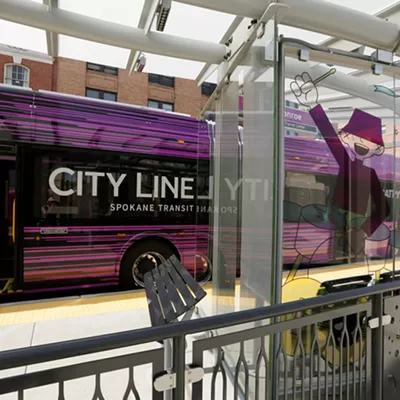
A piano plays softly, and the video cuts to a busy downtown street on a gloomy, rainy day. A bright blue Catholic Charities apartment building looms over passing cars. There's a close-up of a half-eaten sandwich, then a person sleeping outside on a park bench.
"What can we do?" says a woman narrating the Union Gospel Mission video, called "Homelessness in Spokane." "Isn't that the question we're all asking?"
The blue apartment building featured prominently is the Donna Hanson Haven building on Second Avenue, a complex built as part of a "housing first" approach that aims to provide a permanent place to live for individuals experiencing homelessness. The UGM video was released one month after KOMO's "Seattle is Dying" video, and it hits some similar notes that resonated with many people: Homelessness is out of control, and what we're doing isn't working.
"All too often, 'housing first' becomes housing only," the narrator says, suggesting underlying issues like drug addiction aren't being addressed.
It's a clear shot at the "housing first" approach pursued by Catholic Charities. And it signals a deepening divide between the approaches of the two organizations, as the discussion over homelessness in Spokane grows more contentious.
From UGM's perspective, the Catholic Charities strategy of providing low-barrier permanent housing to homeless individuals even if they aren't sober is a way of enabling those battling drug addiction. Phil Altmeyer, UGM's executive director, has been increasingly vocal in recent months criticizing what he sees as a failed model of housing first that is supported by the federal government.
"If you want to solve homelessness, you have to deal with addiction," Altmeyer tells the Inlander. "And that is where the model breaks down: We're not dealing with causes, we're dealing with it by saying we put a roof over their head."
Catholic Charities, however, argues giving homeless people permanent housing has directly contributed to the recent drop in Spokane chronic homelessness, defined as someone experiencing homelessness for at least a year or repeatedly. Jonathan Mallahan, vice president of housing for Catholic Charities, defends the work the organization has done to house people. And he points out UGM is an alternative that puts barriers to getting help.
"They meet a really important need in our community," Mallahan says. "We meet a different need."
Larry Thompson, 46, likes to keep his apartment clean and simple. There's a picture of his daughter by the kitchen, a TV on the ground and an electric guitar by the window. Thompson's been living in this apartment in Donna Hanson Haven for a year.
It's a big step up from the tent in the woods he used to call his home.
"I believe if I still lived out in my tent, I probably wouldn't be here," Thompson says.
Thompson says he struggles with schizoaffective disorder and used alcohol to dull the symptoms. Here, he has easy access to Frontier Behavioral Health nearby and a downtown apartment of his own. Residents also have access to mental health or drug treatment counseling on site.
The cluster of buildings around Second Avenue downtown is filled with similar stories. Between the four — Donna Hanson Haven, Father Bach Haven, Buder Haven and Marilee (run by Volunteers of America) — there are 200 units of permanent housing for the chronically homeless built since 2013. Another building with 50 more units next to Donna Hanson is on the way. The buildings are funded through a national Low-Income Housing Tax Credit program allowing each state to allocate tax breaks to nonprofits for the purpose of developing affordable housing.
The idea is that a place to live can serve as a launching point, providing a basic need and allowing people to get behavioral health treatment, look for work or pursue other goals. Catholic Charities is positive it's working: While the city's annual Point-in-Time count found a slight increase in overall homelessness this year, it also found chronic homelessness has decreased by 21 percent since 2017.
"These buildings," Mallahan says, "are the solution to chronic homelessness."
According to Catholic Charities, 85 percent of residents in these buildings have maintained stable housing for at least two years. "People move in, and most of them stay," says Nadine Van Stone, vice president of crisis response and shelters for Catholic Charities.
But these complexes have been a target of criticism. And Altmeyer, with UGM, hasn't been afraid to speak out.
While he says his criticism is directed at government policies supporting it — not so much Catholic Charities itself — he doesn't think it's a good idea to put all of these affordable housing complexes in one three-block area surrounding House of Charity, the low-barrier shelter operated by Catholic Charities.
"No other city that I know in America has done that," Altmeyer says. "That is almost unheard of."
Altmeyer's philosophy is that housing isn't the problem, and providing housing isn't the solution. He's dismissive of Point-in-Time count numbers showing a dip in chronic homelessness, and suggests that a simple drive through the city can show you that homelessness is getting worse. In his view, low or no-barrier housing and shelter creates a culture that "literally feeds addiction." He says he's gotten calls from people grieving over loved ones who left UGM, qualified for low-barrier housing and died of an overdose.
"I'm not saying everyone's an addict," Altmeyer says. "But you have 50 people in a building, and the majority are struggling with addiction. What do you expect to happen? And how do you expect to manage that?"
He also says he's concerned for "the business community, that supports us, and that's been destroyed downtown." That's partly why he's speaking out now. He suggests business leaders may avoid donating to local nonprofits if they continue to be impacted.
For its part, Catholic Charities absorbs the criticism. Mallahan says those in housing typically aren't the ones impacting local businesses. If one of their residents gets arrested, Catholic Charities gets a record from the police department. If it involves a crime against another person or a "drug dealing activity," then "that is an automatic conversation about eviction," Mallahan says.
About one in five residents actively access mental health and substance-use counseling provided in the complexes, Mallahan says. But all of them engage with peer support staff in the building. And either way, he says, it's better for anyone struggling to be in housing rather than on the street or in an emergency shelter.
"[Our] mission is to bring dignity to people who are vulnerable across Eastern Washington," Mallahan says. "And we do that by giving them a home."
Altmeyer, meanwhile, has also grown used to criticism for UGM's approach.
UGM won't let anyone high or drunk into its shelter, and it tests those they suspect aren't sober. It doesn't hire anyone who identifies as LGBT. It's taken criticism for refusing to welcome transgender people into its shelter, though Altmeyer claims UGM doesn't exclude all trans people and makes the decision on a case-by-case basis. Still, its practices alone were enough to draw a swift backlash from activists when the city of Spokane was considering a land deal with UGM last month. (City Council passed the deal this week.)
As long as they're sober, Altmeyer says UGM will give anyone the basic needs they need to move them in a positive direction. To him, that's accountability. To him, that's compassion. And he would like to see government support for models with more accountability.
"We have to go back to basic principles: Consequences to wrong choices and behaviors," Altmeyer says.
What kind of consequences does he mean, exactly? There, he's a bit vague. He speaks of "lawlessness" pervading society, and he says he hears all the time from people who say going to prison was the best thing for them. But he stops short of suggesting everyone using drugs should be sent to jail, and he says he doesn't have a simple answer for what to do about those who wouldn't be ready for a place like UGM. It's a system problem, he says.
Yet, that's why Catholic Charities argues both approaches are necessary. There are always going to be people who are not ready to stop using drugs.
"So where are they going to go? And who is going to be able to provide a living environment for them and support for them to move forward?" Van Stone says.
The models used by UGM and Catholic Charities have always differed. That isn't new, Van Stone says. But lately, she says the rhetoric has become stronger than it's ever been before.
"It's an important conversation, and unfortunately we're not having it in a topical way," she says. "We're having it in a reactionary way right now." ♦


















